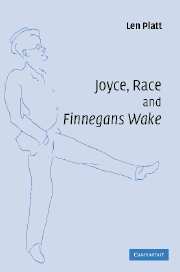Book contents
- Frontmatter
- Contents
- List of abbreviations
- 1 Joyce, race and racism: introduction
- 2 ‘No such race’: Finnegans Wake and the Aryan myth
- 3 Celt, Teuton and Aryan
- 4 ‘Our darling breed’: the Wake, social Darwinism and eugenics
- 5 Atlanta-Arya: theosophy, race and the Wake
- 6 ‘Hung Chung Egglyfella’: staged race in Ulysses and the Wake
- 7 ‘And the prankquean pulled a rosy one’: filth, fascism and the family
- 8 Race and reading: conclusion
- Notes
- Index
1 - Joyce, race and racism: introduction
Published online by Cambridge University Press: 22 September 2009
- Frontmatter
- Contents
- List of abbreviations
- 1 Joyce, race and racism: introduction
- 2 ‘No such race’: Finnegans Wake and the Aryan myth
- 3 Celt, Teuton and Aryan
- 4 ‘Our darling breed’: the Wake, social Darwinism and eugenics
- 5 Atlanta-Arya: theosophy, race and the Wake
- 6 ‘Hung Chung Egglyfella’: staged race in Ulysses and the Wake
- 7 ‘And the prankquean pulled a rosy one’: filth, fascism and the family
- 8 Race and reading: conclusion
- Notes
- Index
Summary
Race is the primary site of this account of the Wake, with race discourse, especially in its ‘scientific’ forms, featuring largely. Such an emphasis requires some explanation because although race is a familiar enough concern of Joyce studies, especially since Vincent Cheng's landmark reading, Joyce, Race and Empire (1995), it is usually worked differently. Most typically it figures in the context of Irish history and postcolonial critical traditions. Here race is often understood in terms of the Derridean binary where the imperial Self becomes conditioned against the colonial Other and vice versa. In this framework the Joyce oeuvre is often formulated as a vigorous and developing engagement around colonial identities. Dubliners (1914) becomes a young man's anatomising of a colonial subject too conditioned, weak or stupid to be extricated from the ‘native’ condition, but also exoticised in some ways as the romantic Other. A Portrait of the Artist as a Young Man (1916) is a more mature and nuanced representation of Irish identity. Here Joyce's prototype artist might declare his resistance to both nation and state, but he proclaims the end of his youth with a determination ‘to forge in the smithy of my soul the uncreated conscience of my race’. With this apparent contradiction, the question of what it means to be ‘Irish’ becomes considerably problematised.
The ‘postcolonial’ phase of criticism has also maintained that race remains a major issue in the mature work of James Joyce.
- Type
- Chapter
- Information
- Joyce, Race and 'Finnegans Wake' , pp. 1 - 13Publisher: Cambridge University PressPrint publication year: 2007



